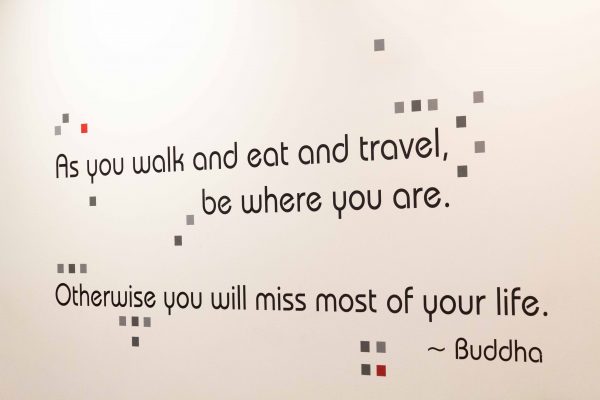
A quote in the Crane Liberal Arts and Science building. Lilly Kujawski | Washtenaw Voice
By Adeline Griffith
Contributor
Recently, my brother spent a sunny afternoon watching Netflix on his phone. My mother was upset and tried to convince him to get out and about. She suggested walking the dog. They argued a little and it was clear that my brother could not see anything wrong with what he was doing. When my mother told him that it was too beautiful a day to stay inside and watch television, he responded, “You don’t understand. This is what everyone does. This is normal.”
It hit me that not only has technology become deeply integrated into our lives, usually in an obsessive and addictive way, but it has been completely normalized. People spend the day staring at a screen—whether it’s watching Netflix, scrolling through social media, playing video games or texting friends—and it doesn’t even cross their minds that it is problematic.
Not that long ago, spending a day immersed in technology was not an option. People occupied themselves just fine, but now it’s an anomaly to spend a week, a day or even just a couple hours without your smartphone. A little over ten years ago, before the first iPhone was released, a phone was merely something to use as a means of communication. It was not an all-in-one device that occupied people for hours at a time.
There have been countless studies that report detrimental effects of excessive screen time. It’s discussed a lot, but we still refuse to accept that it’s not good for us.
A 2010 study conducted by psychologists at Leeds University reported that people who spent long periods of their day on technological devices were significantly more depressed than those who kept a healthy distance.
Technology related depression and anxiety is commonly talked about in its effect on teenagers, but the individuals who participated in the survey ranged from age 16 to 51. We need to realize that it affects all of us, not just teens.
What’s more overlooked, and perhaps more concerning, is what technology is doing to our ability to live a mindful, soulful, real life.
“The internet is harming well-being,” said Meg Mott, a professor of politics at Marlboro College, in a survey conducted by the Pew Research Center in 2018. “The devices make it so easy to find answers elsewhere, that students forget to ask deep questions of themselves. This lack of uninterrupted introspection creates a very human problem: the anxiety of not knowing oneself.”
“The more the culture equates knowledge with data and social life with social media, the less time is spent on the path of wisdom, a path that always requires a good quotient of self-awareness,” Mott said.
There is a quote painted on the wall of the LA Building, just beyond the bridge to the Computer Commons that reads, “As you walk and eat and travel, be where you are. Otherwise you will miss most of your life.”
Ironically, many of us don’t even realize the quote is there. We walk by, our faces illuminated with the bright light of a smartphone, and completely ignore our surroundings. We bump into people, maybe mutter a token apology and continue on our way; right past the very message that we so desperately need.
In my experience, the best way to realize just how much we don’t need technology is to spend time without it. Every year I stay at a cabin in Northern Michigan for a week, with absolutely no cell service or wifi, and and every year I feel like an idiot for the amount of time I spend scrolling through social media to relieve my boredom and watching television every night before bed. At the cabin, I read before bed instead. If I’m bored, I take a walk or play a game with my family.
When the week is over and my family returns home, our reliance on technology slowly slips back. My brother watches Netflix on his phone, I scroll mindlessly through Instagram and my mother delves into the internet rabbit hole.
Although I was taken aback by seeing my brother watch Netflix for an entire day, we are all guilty of spending an unnerving amount of time staring at a screen, myself included. It’s a hard habit to break.
Technology is not inherently a terrible thing. There are plenty of benefits, but it is imperative that we learn to control our usage and stop it from going overboard. The first step is understanding the reality of our usage, and being aware of the problems it can cause. From there, we can work to build a healthy relationship with our technological devices.
Tips to spend less time on technology:
- Shut your phone off completely and leave it out of sight for select periods of time
- Designate certain screen-free times throughout your day. A few commonly suggested times are in the morning, before bed and during mealtimes
- Try leaving the house without any technology. Maybe a whole day seems like a bit much (at first), so start with when you take a walk or meet a friend for coffee
- Download an app that tracks your usage, such as Moment. Moment shows how much time you spend on your device and offers a “coaching” feature to help you learn healthy screentime habits
- Try a short “detox.” Delete social media, games, Netflix or whatever is most addicting for you for a week or month at a time
- Find screenless activities that you enjoy, and focus on them!


